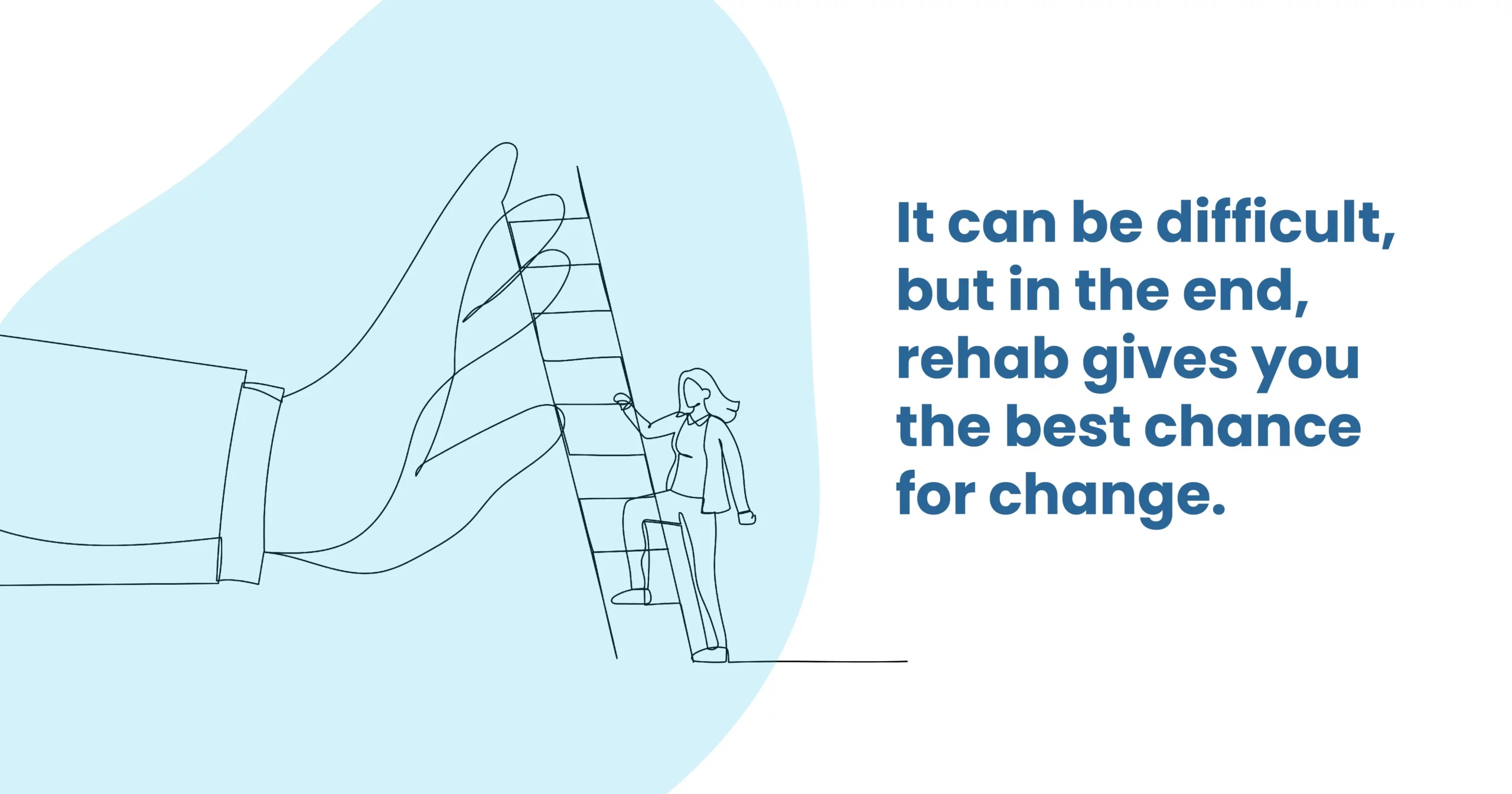Addiction affects not only individuals but also their families, friends, and social circle. Sometimes, living with people with addiction becomes very hard, challenging, and irritating. At this stage, rehab becomes necessary.
Getting someone into rehab is complex and can take more time than expected. There are multiple hurdles on the way to convincing someone.
In the following article, we will learn how to convince someone to enter a rehabilitation program.
Key Takeaways
Drug Addiction is harmful not only to psychological health but physical health as well, requiring treatment as soon as possible. Before getting treatment, you must convince your loved one to go to a rehab program.
The following article will elaborate on the possible ways to get someone into rehab.
- You can convince your loved one to go to a rehab program through conversation using a non-confrontational approach, appropriate time and place, and behaving like support.
- Planned intervention is the most effective way to convince someone to go to a rehab where family members share their concerns about addiction.
- Involuntary commitment is the last option to get someone into rehab through court by filing an affidavit and getting a court order.
- Other steps for convincing someone to rehab include understanding the signs of addiction, possible treatment options, and support during the recovery program.
Get professional medical assistance from The Haven Detox-New England to convince your loved one to attend a rehab program. Contact us: (844) 933-4145
Having The Conversation
Most people with addiction may not admit addiction at all. When there is no admission, there is no chance of getting into rehab. So, what is the solution?
Conversation is the first step to convincing your loved one to a rehab program. Follow these steps for a successful conversation:
Non-Confrontational Approach
A friendly tone and non-confrontational approach are the baselines of your conversation. It would help if you were cool, calm, and composed throughout the discussions.
Don’t become aggressive because people with addiction may already feel a lot of guilt and shame. Any harsh comment may move them away from rehab.
Appropriate Time and Place
Choose a suitable setting, time, and place to talk about addiction. Family dinners, holiday trips, and weekend plans may be ineffective in this regard.
Private moments in a comfortable space may play a vital role. You may not get an effective conversation outcome if you do it at an inappropriate time.
Learn More about Addiction
Complete information about addiction is essential for discussion. If you don’t know much about the signs and symptoms, adverse effects of addiction, or rehab benefits, you will not be able to convince someone to rehab.
Behave Like a Support Group, Not a Doctor
Most of the time, people with addiction expect support from family and friends. Some people may get ready voluntarily for a rehab program.
It would help if you allowed them to decide about the rehab duration and let them make other choices about treatment centers. Try to agree with them on matters of the rehab process and medications.
Planned Interventions
A planned intervention might be the most useful and effective way to convince your loved one to go to rehab treatment. Planned intervention means gathering family, friends, and other influential members of your social circle.
All the members need to be addiction-free for participation.
The planned intervention focuses on the effects of addiction of concerned individuals on the lives of friends and family members. The members explain how the habit is disturbing their lives. The explanation can encourage people with addiction to seek a rehab program.
Before the intervention, most individuals may not think about the adverse effects of addiction on their families. But it would help if you organized planned intervention appropriately.
The selection of time, place, and members plays a vital role in the practical outcome of the planned intervention.
The involvement of medical professionals in intervention meetings can be very effective.
Involuntary Commitment
Involuntary commitment is a court procedure requiring documental proof for getting someone into rehab. A court order allows families of people with addiction to take them into a rehab center without their consent.
Different US states have different laws about involuntary commitment. The order depends on the examination of the individuals, the judges’ observations, and the local health authority’s recommendations.
The criteria of a court are:
- The individual with addiction is a threat to family members and the community.
- The individual is unable to take care of themselves.
- The individual may be a danger if left without treatment.
Anyone believing that someone with addiction may harm themselves or others needs a court order to proceed with the treatment process. To get a court order, anyone can fill out an affidavit.
The document needs to be:
- Legally crafted in nature and possessing all the information under the local laws.
- Establish the connection among the individual, addiction, and treatment needs.
- Reveal data based on solid and reliable sources or personal experience.
After filing an affidavit, the matter is up to the court’s will, which may demand further documentation, such as a statement from a professional and authorized doctor.
The court proceedings may take days, weeks, and even months. But, if the evidence is strong enough, the court can order temporary detention.
The local police assist the court and transport the individuals to the nearby hospital or rehab center.
In some states, the local mental illness board examines the individuals. After all the evidence and reviews, the court makes a final judgment.
If the magistrate grants your petition, they issue a court-order treatment and direct an officer of the police to arrest the person. The police drive the individual to a hospital emergency room or another suitable medical facility for a checkup.
A 24-hour facility will admit the person if the examining clinician determines a threat. At that point, a second examination occurs, and the second clinician decides whether the patient should be free or admitted to a substance abuse treatment facility.
Legally, the person is required to follow this advice, but a hearing before the court will be held within ten days to decide how to proceed.
A qualified clinician can submit the petition, which is the first examination. If the magistrate grants the petition and issues an order, a police officer takes the petitioner directly to the institution, where the remainder of step one’s procedures occur.

How to Support Your Loved One
Understanding the Signs of Addiction
People who drink or use other drugs may not feel the symptoms of addiction. Family members and friends need to understand and observe the symptoms of addiction. There may be numerous warning signs of addiction, such as changing behavior and physical pains.
Find the Best Treatment Options
Before selecting a suitable treatment option, you must find some basic questions about addiction treatment.
- Type of program (inpatient, outpatient, or detoxification)
- Duration of the program (Short-term or long-term, 30-days, 60-days, 90-days)
- Location of the rehab center
- Treatment approach (type of therapy, faith-based approach, trauma-based approach)
- Treatment finances (self-supporting, insurance, state-provided funds)
Support During Recovery Process
There are numerous ways to support individuals with addiction during recovery. The most operative way is to assure them that you care and listen to their needs. Some people with addiction may ask for help, and continuous support is vital.
Learning more about recovery is another significant way to support someone receiving treatment. If you’re more knowledgeable, you may discuss their problems and encourage their healing, moving forward from a position of knowledge rather than ignorance.
Along with educating yourself, you should be truthful and inspire responsibility in your loved one. Being accountable for your behavior and accepting constructive criticism as you get better are critical components of getting sober.
Frequently Asked Questions (FAQs)
Can you make a family member go to rehab?
Many states in the US permit parents to force their underage kids (under 18) to go to drug and alcohol rehab without the kids’ permission. However, for individuals who are over 18, things differ. Involuntary commitment laws do exist in many states of the US.In some cases, you can force someone into a rehab program. One option is through drug courts, which prevent nonviolent criminals with substance use disorders (SUD) from going to prison.
The court orders to enter into closely monitored treatment programs, focusing on therapy rather than punishment.
In 2015, more than 30% of patients over 12 received addiction treatment after a court judgment.
What can you do if someone doesn’t want to go to rehab?
It becomes very tough to assist individuals who don’t want to get help. In such a situation, a slight mistake can make the matter worse. You need to learn some techniques if your loved one is not ready for rehab despite addiction:
Get complete information about addiction (signs and symptoms, Treatment options, side effects of addiction, etc.).
Offer unconditional support (don’t be judgmental in discussions, behave like an inspiration).
Don’t threaten as the last option (avoid creating an extreme).
Keep addiction separate from seasonal feelings or work stress.
What is the shortest time you can stay in rehab?
Addiction treatment plans may vary from person to person. A typical treatment may last between 30 to 90 days. The most common treatment option is a 30-days rehab program.The shortest stay possible is often a 30-day recovery program. Though 30 days might not seem like enough time to overcome an addiction, that can be pretty helpful. A 30-day rehab program offers people structure and assistance as they detox and learn how to live soberly.
What is the success rate of people who go to rehab?
About 89% of patients who complete alcohol rehab remain sober one month after release.An estimated 76% of alcohol addiction patients who complete treatment successfully report continuing to be sober at three months, 69% at six months, and a little over 70% at nine months.
Nine months after being discharged, 85% of those who successfully finish drug rehab report abstaining from all substances.
After completing drug and alcohol rehab, around 80% of patients say their quality of life and health have improved.
Can you force someone into rehab for alcohol?
In many US states, you can force someone into rehab for alcohol. You only need to fulfill specific requirements.Some of the essential requirements are:
A “physician’s commitment” is a lawful certificate that allows the police to come to get your loved one and is issued by a medical professional.
A judge can declare your loved one mentally incompetent and will issue a bench order authorizing the police to arrest your loved one.
A family member may sue and file a court petition on their behalf with an attorney, who then presents the matter to the judge for possible institutionalization.
Get Help from The Haven Detox-New England
Addiction is not an individual issue. It is a problem for family members and friends of people with addiction. You can follow some steps for convincing someone into a rehab program.
The Haven Detox-New England rehabilitation facility is here with medical care to assist you in such a situation.
We offer a range of rehab services, such as dual diagnosis, detox services, and therapy sessions. Our top-notch addiction treatment services include residential treatment. If you are worried about the addiction of your loved one, seek professional help.
Feel free to dial: (844) 933-4145




